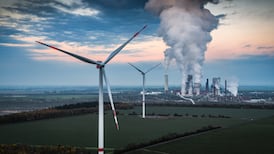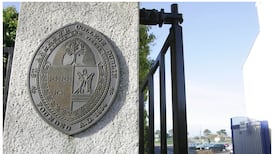Make no mistake about it, EU leaders are not racing to the UN Cop30 summit in Brazil, jubilant with a last-minute deal to embark on scaled-up climate ambition to counter the worsening climate crisis unfolding before our very eyes.
Yes, the EU has belatedly agreed, following tortuous overnight negotiations, its revised climate commitment, known as a nationally determined contribution (NDC).
It adds up to a watering-down of the goal as they raced to clinch a deal before global leaders gather in Belém and hard negotiations start on Monday. NDCs are the main lever for global climate action and were due to be revised upwards before Cop30.
EU environment ministers have approved a compromise to cut emissions by 90 per cent by 2040 from 1990 levels but “flexibilities” weaken this aim.
READ MORE
The outcome doesn’t augur well for a substantive outcome at Cop30, when one of the world’s mega economies is diluting its climate commitments. When initially proposed it was globally significant, but that 90 per cent figure is now diminished.
[ EU states agree deal to slash carbon emissions by 2040Opens in new window ]
Several member states including Italy and Romania refused to agree to the legally binding 2040 goal unless concessions were made allowing countries to claim 5 per cent of their emissions reductions by selling international carbon credits. These are “permits” that represent one tonne of carbon dioxide removed from the atmosphere, though there is no watertight global system guaranteeing their credibility.
The outcome could also allow countries to claim a further 5 per cent of the goal through credits in case of emergencies, such as wildfires, and for them to review the 90 per cent target if it is causing economic setbacks.
On the coattails of this, Ireland has won concessions on 2030 targets, which it is currently struggling with. The European Commission has recognised particular demands in agriculture. Irish farmers will be relieved as mitigation targets are likely to be less onerous.
For countries finding it difficult to meet those overall 2030 targets, there will be flexibility on compliance fines, which risked running to billions of euro – ie taxpayers’ money – in Ireland’s case. There is acceptance huge compliance costs are not merited when funds should be best spent on decarbonisation, transitioning to clean energy and adaptation measures to counter climate impacts.
But this is a not a get-out-of-jail card because Ireland – despite its considerable wealth – is far behind most member states in cutting emissions. Being a global leader, as it aspires to be, requires doing what it has committed to do.
So demanding legally binding carbon budgets still applies to all sectors including industry. Individual householders will feel it in their pockets if they persist in using fossil fuels, the biggest cause of carbon pollution.
Minister for Climate, Energy and the Environment Darragh O’Brien insisted the outcome “represents an important milestone in shaping Europe’s long-term response to the climate crisis and in setting a clear direction for our collective efforts beyond 2030”.
Key Irish concerns were addressed “including recognition of the particular characteristics of our agriculture sector, the importance of maintaining energy affordability and security, and the need to ensure social cohesion as we continue the transition to a climate-neutral economy”.
With an eye to holding the EU presidency in 2026, O’Brien added: “Ireland now looks forward to working closely with the European Commission on developing credible and fair pathways towards 2030 compliance, and with all member states next year on the broader implementing package that will give detailed effect to the headline agreement reached overnight.”
Not only that, Ireland will have a key role to play leading on behalf of the EU this time next year when Cop31 convenes and the climate crisis is odds-on to be more challenging, amid collective failure to apply the required urgency to the problem.














